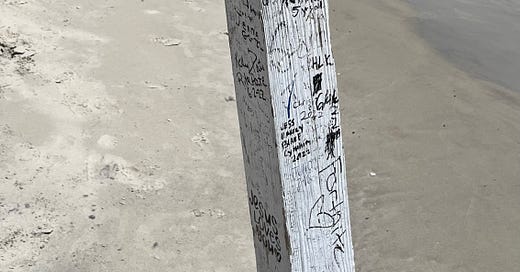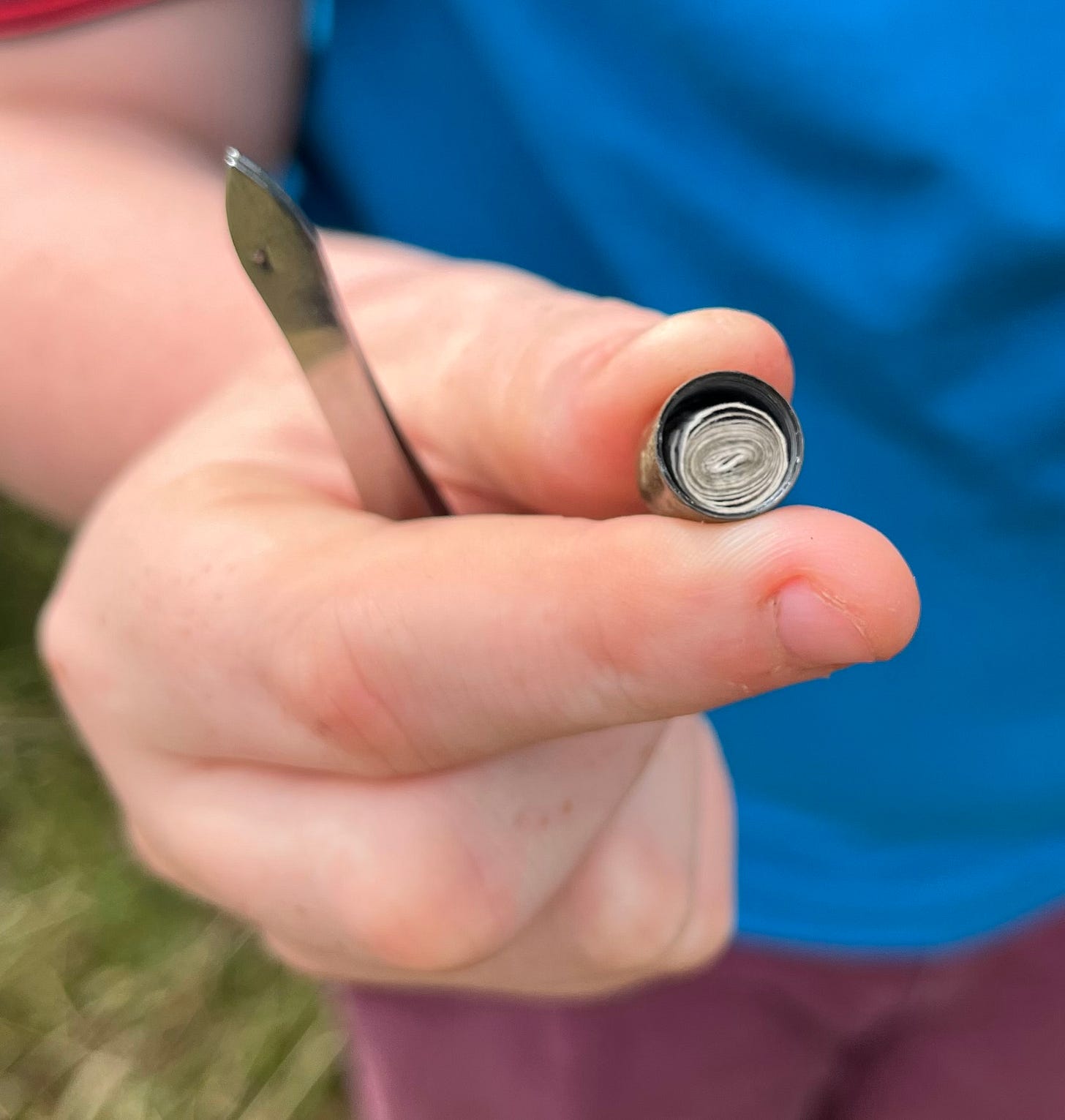Welcome aboard The Bus!
ORIGINALLY PUBLISHED (1.32) 25 JULY 2022
The Stop
Originating in Oregon in 2000, geocaching combines technology and geography in a ‘type of global treasure hunt’ where people hunt for caches – hidden stashes of objects. Initially called geostashing, the hobby uses GPS devices and the internet to provide online clues to hidden caches in a reinvention of the older activity of letterboxing.1 There are currently millions of active caches all over the world, found in all sizes and types.2
The ‘hidden treasure’ in geocaching is known as a cache. Following a given cache’s registered longitudinal and latitudinal coordinates, geocachers search for the item which has two or three components: a waterproof container, a logbook listing the names of cache finders, and sometimes a low-cost trinket such as ‘foreign currency, keychains, ornaments, or booklets.’ Valuable objects, food or items that might be easily damaged are not allowed and – in order to ensure safety – caches can be located no closer than 150 feet to a railroad track and should not be put in places of obvious danger. Once found, the geocacher writes his or her name on the provided log, registers the find on the GPS-powered app and – in the case of the cache having trinkets – exchanges one with an equivalent or greater value.
The difficulty of the hide and the terrain are rated on a five-star system, starting with a single star which is considered ‘wheelchair accessible’ and ranging to five stars which requires specialist equipment to gain access. Caches come in a wide range of shapes and sizes, with beginners encouraged to start by seeking ‘regular’ sized ones as they are supposedly easier to find. Though caches are not allowed to be buried, they can be well camouflaged or hidden and while most containers have a ‘straightforward boxlike shape, there are no absolute rules.’ Consequently, caches may be placed inside containers that are replicas of items, including false rocks, 3D printed versions of logs, fencepost caps and even things such as fake birdhouses. At the ‘micro’ end of the cache system, tiny ¾ inch-long waterproof ‘nanos’ - which can be magnetically attached to fences or the back of road signs - are frequently used.
While finding caches can be difficult, it is not meant to be impossible. Consequently, most geocachers provide clues or hints to the cache’s location, such as noting that it might be at the base of a large vine, ‘hidden on one side of a tree,’ or visible only from a certain angle. Geocachers are encouraged to avoid being obvious when searching, in order to prevent non-cachers (known as ‘muggles’) from discovering the caches and perhaps disrupting their placement.3
To learn more about geocaching,4 see: Geocaching
The Detour
Today’s Detour is to an article from Smithsonian which provides an interesting perspective on the use and acceptance (or not) of fossil fuels. With so much animosity against the use of non-fossil fuel technologies today, the author reminds us that once coal was seen as the unwanted – hated – usurper against the common use of wood. With forests declining and coal abundant, wood-burning stoves were encouraged to be replaced with coal-burning ones … and this became a problem.
The Recommendation
Today’s Recommendation is Masquerade, by Kit Williams. For the first time since beginning The Bus, I’m recommending a book I’ve not read - but my wife suggested this as a perfect accompaniment to today’s Stop.
Published in 1979, Masquerade is a picture book containing riddles and clues to (at the time) a real buried treasure. Though the physical treasure (a golden jewelled hare created by Williams) has been long found,5 the challenge of solving the puzzle remains.
The Sounds
Today’s Playlist is based roughly on the topic – hidden, treasure, buried; you get the idea. They’re all good tracks: ‘Treasure’ (2012) by Bruno Mars, ‘Under the Bridge’ (1991) by Red Hot Chili Peppers, a great cover of ‘Under the Boardwalk’ (1964) by The Rolling Stones, ‘Bury Me’ (1991) by The Smashing Pumpkins and ‘You’ve Got to Hide Your Love Away’ (1965) by The Beatles. Enjoy!
The Thought
Today’s Thought is a quote from the jazz legend (and my favourite jazz musician) Miles Davis:6
“Man, sometimes it takes a long time to sound like yourself.”
If you have a thought on this Thought - or any part of today’s issue - please leave a comment below:
And that’s the end of this stop - I hope you enjoyed a brief diversion from your regular journey!
Thanks to everyone who subscribes - I genuinely appreciate your interest and support. If you like The Bus, please SHARE it with a friend or several hundred.
If you haven’t climbed aboard, please do!
Until the next stop …
Letterboxing is similar, but the clues to the locations and hidden caches are provided in booklets and other forms of printed material. It is described as combining ‘artistic ability with “treasure-hunting” in parks and forests that the whole family can enjoy. Participants seek out hidden letterboxes by following clues to their prize: a rubber stamp—often hand-carved—to stamp into one’s own personal logbook.’ For more information, see: Letterboxing
I geocache, so much of this is first-hand, but sources for today’s Stop include: Geocaching and Geocaching (National Geographic)
‘Muggles’ is a deliberate reference to non-magical people in the Harry Potter books and films – which were very popular when geocaching began.
The Boy Scouts of America offers a Geocaching merit badge, see: Geocaching Merit Badge (BSA)
In the spirit of any sort of such a highly-publicised treasure hunt, controversy followed: in 1982 a claim to have solved the puzzle was made, but this was found to be fraudulent and resulted in a scandal. For an account of the hunt and the scandal, see: Masquerade (BBC).
Davis is the topic of a future Stop - complete with playlist - but for a good bio in the meantime, see: Miles Davis (Britannica)









Glad to have found this corner of Substack, great read!
Oddly enough, I wrote about my own experiences with Geocaching this week https://fromherenow.substack.com/p/hidden-in-plain-sight
Ooooh, loved this, Bryan! I've never been geocaching but it's pricked my interest.